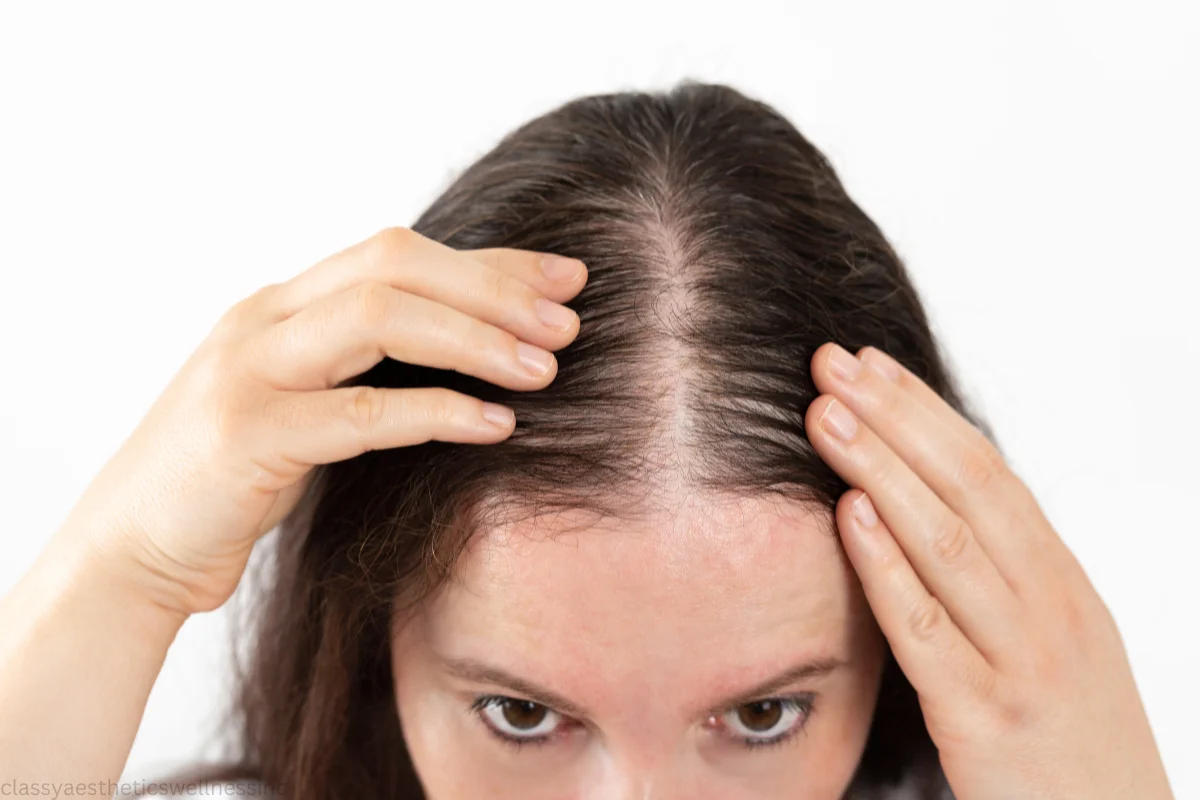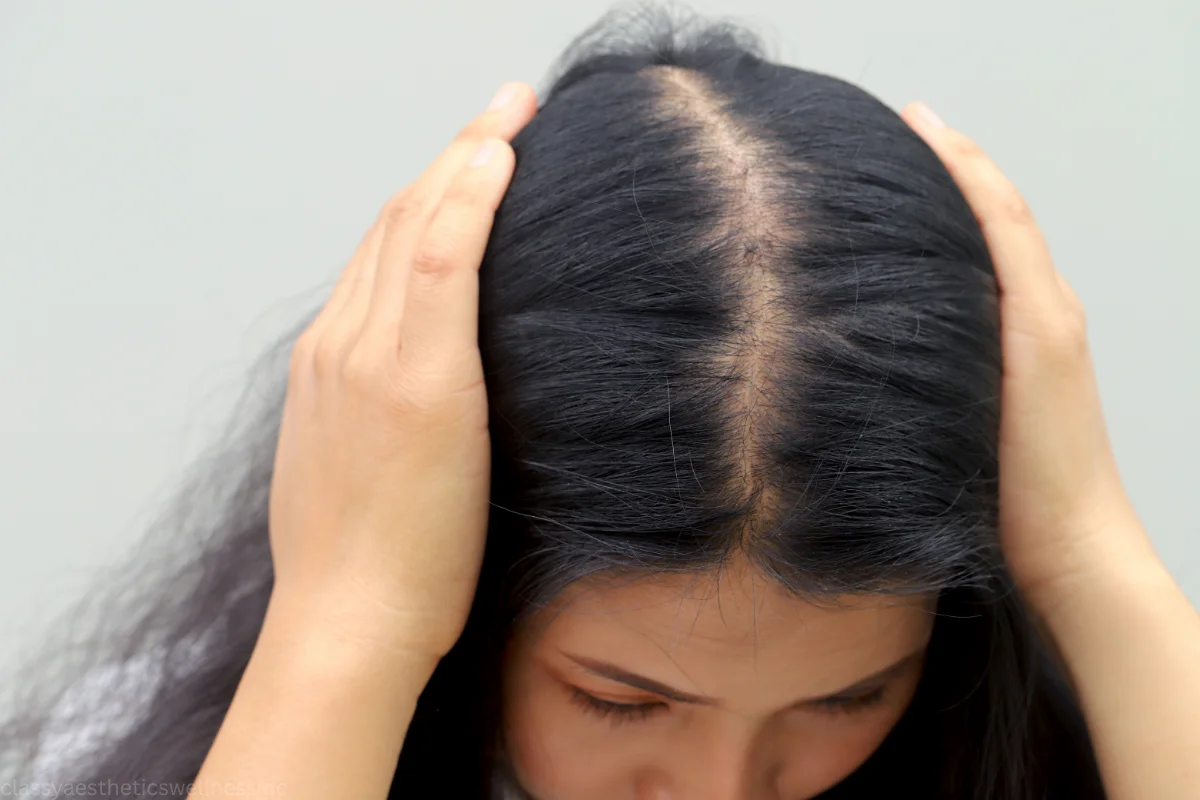
Tirzepatide may cause temporary hair shedding in some cases. Learn more about the potential side effects and how to manage them on your weight loss journey today!
Tirzepatide is a medication prescribed for weight loss and type 2 diabetes management. It helps regulate blood sugar and reduce appetite, making it effective for weight control. However, some users have reported tirzepatide hair loss as a potential side effect.
While not everyone experiences this, hair shedding has been reported by some. This has raised concerns about whether tirzepatide is directly causing the hair loss or if other factors contribute. In this article, we’ll explore why this happens, how to manage it, and what you can expect for hair regrowth.

Tirzepatide assists with weight loss and blood sugar management, but rapid weight loss can sometimes lead to hair shedding. When the body undergoes quick changes, like significant weight loss, it can cause stress, which disrupts the hair growth cycle and leads to increased shedding. This is a common concern when tirzepatide and hair loss is reported. So, why does tirzepatide cause hair loss in some individuals?
In some cases, tirzepatide triggers telogen effluvium, where many hair follicles enter the resting phase prematurely. Stress, hormonal fluctuations, and nutritional changes from weight loss can contribute to this temporary hair shedding.

Rapid weight loss from tirzepatide can cause a lack of essential vitamins and minerals like zinc, biotin, and iron, which are vital for healthy hair.
Tirzepatide reduces appetite, leading to less protein intake. Protein is crucial for strong hair, and a lack of it can cause thinning.
The stress of rapid weight loss can push hair follicles into the resting phase, leading to hair shedding.
Hormonal changes from weight loss or medication adjustments can disrupt the hair growth cycle, contributing to thinning.
Each person’s body reacts differently to tirzepatide. Some may experience hair loss, while others may not, depending on factors like stress and hormonal balance.

Hair loss tirzepatide is not a common side effect for everyone. Many people use the medication without experiencing hair issues. However, some may notice temporary hair shedding during treatment, which can be a result of tirzepatide side effects hair loss.
Hormonal changes and nutritional deficiencies contribute to temporary hair loss. Rapid weight loss and hair falling out can occur as hair follicles enter the resting phase. This is common during weight management treatments like tirzepatide, but it’s usually temporary.

Both Mounjaro and Zepbound are brand names for tirzepatide and can have similar effects on hair loss. While these medications are used to manage weight loss and type 2 diabetes, both may lead to hair shedding due to rapid weight loss.
Many people are curious if hair thinning is more noticeable with Mounjaro compared to Zepbound. While individual responses vary, reports suggest that both medications cause similar levels of hair shedding because they share a common weight-loss mechanism.
If you experience hair shedding while using Mounjaro or Zepbound, consult a healthcare provider to assess nutrient deficiencies or adjust your treatment plan. For those dealing with tirzepatide hair loss, exploring a tirzepatide hair loss treatment may improve shedding management.
If you're experiencing tirzepatide hair loss, it can be concerning, but there are effective ways to minimize shedding and encourage hair regrowth.
Although tirzepatide hair loss can be distressing, taking the right steps can help minimize shedding and support hair regrowth.
For those concerned about tirzepatide hair loss recovery, focusing on consistent nutrition and scalp care is key to supporting healthy regrowth.
Hair thinning from tirzepatide is typically not permanent. Most individuals see hair regrowth within 3 to 6 months after their body stabilizes. If you still notice thinning beyond this period, it may be time to explore additional treatment options with a doctor.
If hair thinning persists beyond this point, consider consulting a dermatologist to create a tailored treatment plan to encourage hair regrowth.


Lifestyle factors such as stress, diet, and exercise can influence hair loss from tirzepatide. Rapid weight loss can trigger telogen effluvium, causing hair follicles to enter the resting phase and increasing shedding. Excessive shedding from stress can worsen hair loss.
To reduce stress and support hair health, maintain a balanced diet with essential nutrients, especially protein. Protein is key for healthy hair growth. Regular exercise can also lower stress levels, helping to protect hair from thinning. Consider making these lifestyle changes to complement your tirzepatide treatment.
To prevent hair loss, focus on a balanced diet rich in protein and essential nutrients. Regular exercise and stress management also help.
Hair loss is not common, but some users experience temporary shedding due to rapid weight loss and hormonal changes.
Yes, hair usually regrows within 3 to 6 months after the body stabilizes. Patience is key during this process.
Most side effects, including hair loss, typically improve within a few months. Consult a doctor if symptoms persist.
Tirzepatide is generally safe for long-term use. However, it’s important to monitor hair health and consult a healthcare provider if shedding continues.

Tirzepatide-related hair loss is usually temporary and linked to rapid weight loss. With proper care, it can be managed. A balanced diet, stress management, and hair treatments can help reduce shedding.
If you’re concerned, consult a healthcare provider for personalized advice. They can recommend treatments to support regrowth. With the right care, hair loss can be addressed, and hair will regrow within a few months. For those using tirzepatide for medical weight loss, these strategies can improve results.

EXCELLENTTrustindex verifies that the original source of the review is Google. Estoy más que feliz y agradecida con Classy Aesthetics, por que gracias ustedes estoy alcanzando mi objetivo en mi peso, las vacunas no me causaron ningún síntoma fuerte más que poquito dolor de cabeza pero tomas agua y listo!! Gracias realmente estoy muy contenta con mi cambio🥰❤️Posted onTrustindex verifies that the original source of the review is Google. Im so glad I found someone who knows what they're doing. My lips look natural! I most definitely recommend her! Thank you so much!Posted onTrustindex verifies that the original source of the review is Google. Super professional, and always available for advice.Posted onTrustindex verifies that the original source of the review is Google. Elizabeth is very kind and very professional, she is helping me with weight loss, she was great at explained everything to me, I most definitely recommend he.Posted onTrustindex verifies that the original source of the review is Google. Classy asthetics is such an amazing place as soon as you enter you feel the positive warming vibes from Elizabeth. If your someone who wants to loose weight or is stuck I recommend coming to Elizabeth shes awesome & explains everything so well.Posted onTrustindex verifies that the original source of the review is Google. I loved my experience with Elizabeth! Very professional & helpful! ❤️ I recommend her 100%!Posted onTrustindex verifies that the original source of the review is Google. I came across her page through some TikTokers to be more exact the twin sisters, if you know you know lol … One of the sisters progress convince me into looking more into her service provides, and I was sold.. She is really good at communicating with you and answering all your questions. Customer service was great shipping next day was crazy.. Had zero issues… I highly recommend … and the fact I didn’t have to go in person was even better !Posted onTrustindex verifies that the original source of the review is Google. Muy buena atención te explica súper bien te sientes segura en venir a este lugarPosted onTrustindex verifies that the original source of the review is Google. I was so comfortable with Elizabeth! She is very educated on all the medications and she was great at explaining everything to me! I felt really relaxed and had no doubts by the time I left. I recommend her 100% and I will continue to come with her!Posted onTrustindex verifies that the original source of the review is Google. Great experience. Elizabeth was very professional and helpful. I am so glad a was able to get the help that I got from her. When I had a question she always made sure to explain everything thoroughly. I most definitely recommend!
Advanced Skincare and Wellness Tailored for You





